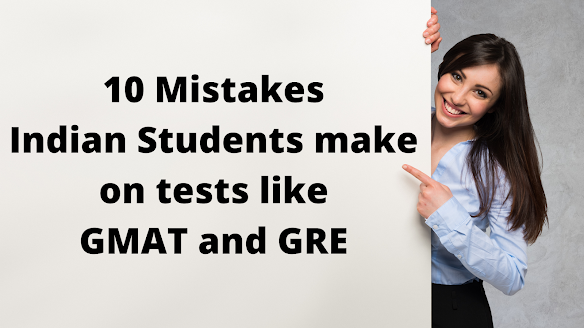10 Mistakes Indian Students make on tests like GMAT and GRE
In India, there has been a steady increase in the number of students studying abroad. With over three lakh students abroad, India is second only to China for students going abroad to pursue international degrees. This trend may be because we have seen an increase in GMAT and GRE test-takers in India. Students consider the GMAT and GRE as the gateway to the colleges of their dreams.
But, do Indian students crack these exams in the right way? More importantly, what are the top mistakes Indian students make on tests like the GMAT and GRE?
Here are the top 10 mistakes that Indian students make when studying abroad like GMAT and GRE:
1. View examinations only as a test of subject knowledge
There is a common misconception among Indian students that whatever exam they take is just a test of knowledge. The GMAT and GRE can be tricky. They test a candidate's business communication skills, not their English. And they test their analytical application skills and not their knowledge in mathematics.
2. Try to find the right and exact answer instead of the best answers
This may sound strange to many, but the GMAT and GRE are not tests that require a candidate to find exact answers. Most of the time, they try to find the exact answer to a question without looking at the options given. They need to find the best answer out of the five options provided, even if the answer doesn't seem right!
Also Read:
3. Getaway and forget that time is ticking
GMAT and GRE are tests that require a candidate to keep track of the time invested in a question. If the candidate is not able to answer each question in the given time, all his/her efforts will be in vain.
The brain functions differently as time passes, and they need to be prepared for it.
4. Wait until they are 100% sure of the answer
Thanks to the Indian education system, we have all been taught to answer only when we are sure it is correct.
But on the GMAT and GRE, a candidate needs to learn to make educated guesses on some questions. This will help them save time for the ones they can solve!
5. Apply the "brute-force" approach
We all would have had a classmate who studied for 14 hours a day or referred to every single book on the planet before taking exams. Maybe they got good grades in school.
But this method will not work for those who are preparing for GMAT or GRE. With these exams, it is all about studying smartly by practicing and analyzing questions and answers.
6. Rely only on 'accuracy' as a metric
Don't rely on 'accuracy' as a metric because the GMAT evaluates a candidate based on the inherent difficulty of the questions they solve.
If they answer more than 700 mark-level questions correctly, the candidate will get to solve more questions of the same level.
7. Don't expect exam questions to be difficult
The questions in these tests can be quite confusing. The tough questions from GMAT and GRE will look no different from the rest. In fact, they can seem really easy to solve.
Due to this, a candidate can quickly choose the wrong answer. Only later do they realize their mistake and analyze the question.
8. Practice only for short durations
GMAT and GRE are tests that last for three hours. When candidates practice questions at home, they will solve them because they are not under any pressure and because their sessions may be short. But, on the day of the exam, it will be challenging for them to concentrate for such a long period. To avoid this they need to practice giving complete exam in given time limit at home itself.
9. Rely on Weekends Only for Preparation
A candidate preparing for the GMAT or GRE should practice questions consistently, not just on weekends or whenever they have time.
Even though they are working, they need to make sure that they set aside some time during the week and practice questions. Consistency is the key.
10. Choose Wrong Study Material
There are a lot of institutes online that sell GMAT and GRE prep courses and materials. But most of them will teach techniques that candidates will not be able to apply quickly while taking the exam.
A candidate preparing for these exams should procure the right resources and choose the best course available to make them better.





Comments
Post a Comment